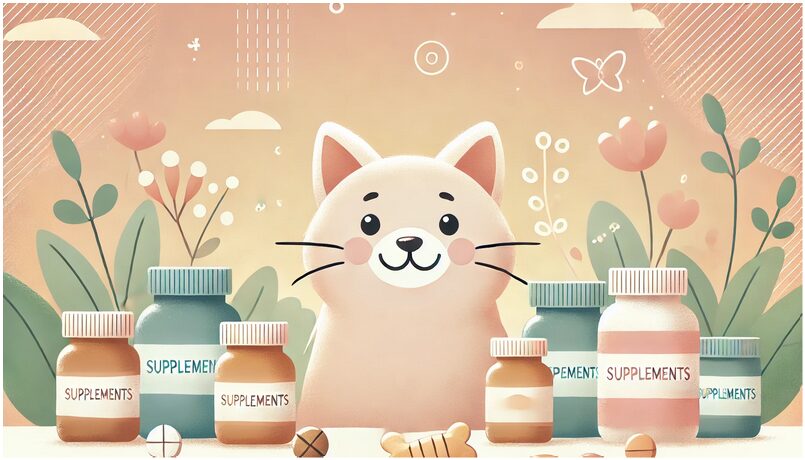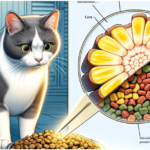With a wide variety of supplements available for cats, from vitamins and minerals to probiotics and joint support, cat owners may wonder: are these supplements truly beneficial for our feline friends? As the market for pet wellness continues to grow, it’s easy to feel overwhelmed by the options and claims made by manufacturers. In this post, we’ll take a deep dive into the world of cat supplements, examining whether the benefits are worth the cost, what science says about their effectiveness, and how best to give them to your cat if they’re a good fit.
1. Types of Cat Supplements
Before we get into the benefits and science behind cat supplements, it’s essential to understand the types available. Each supplement is intended to target different aspects of feline health:
- Multivitamins: Designed to provide a balanced blend of essential vitamins and minerals, multivitamins are often marketed as a catch-all for filling any nutritional gaps.
- Probiotics: These supplements aim to improve gut health by introducing beneficial bacteria, potentially helping with digestion and immune function.
- Omega-3 Fatty Acids: Sourced from fish oil, omega-3 supplements support joint, skin, and coat health.
- Joint Support Supplements: Glucosamine and chondroitin are common ingredients in these products, intended to ease joint pain and improve mobility, especially in older cats.
- Antioxidants: These can include vitamins C and E, which are believed to support immune health and protect cells from damage.
- Specialized Formulas: Some supplements target specific health concerns like urinary health, heart health, or kidney function with tailored ingredients.
2. Are Supplements Necessary for Your Cat?
For most healthy cats receiving a balanced, high-quality diet, supplements may not be necessary. Commercial cat foods are usually formulated to meet feline nutritional needs, including essential vitamins and minerals. However, there are some situations where a veterinarian might recommend supplements:
- Senior Cats: Aging cats may benefit from additional joint support or digestive aids, especially if they show signs of arthritis or gastrointestinal discomfort.
- Cats with Chronic Health Conditions: Cats with kidney disease, for instance, might benefit from supplements to support kidney function and reduce the workload on these organs.
- Cats with Dietary Restrictions: Some cats with food allergies or sensitivities might miss out on specific nutrients due to limited diets, and supplements could help fill these gaps.
3. Do Supplements Really Work? A Look at the Science
While the benefits of supplements are widely promoted, the scientific backing for many feline supplements varies. Here’s a look at some of the more common supplements and what science says about their effectiveness:
Omega-3 Fatty Acids
- Evidence: Numerous studies show that omega-3s, especially EPA and DHA, can reduce inflammation and support joint health. They may also improve coat condition and help manage skin allergies in some cats.
- Effectiveness: For cats with arthritis or skin issues, omega-3s can be beneficial. However, they should only be given under veterinary supervision, as dosing is critical.
Probiotics
- Evidence: Probiotics have shown promise in enhancing gut health and immune function in animals. They may benefit cats with digestive issues like diarrhea or inflammatory bowel disease (IBD).
- Effectiveness: The effectiveness of probiotics can vary widely depending on the strain used and individual cat response. Look for products with scientifically tested strains, such as those containing Enterococcus faecium or Lactobacillus acidophilus.
Joint Support (Glucosamine and Chondroitin)
- Evidence: Glucosamine and chondroitin are frequently recommended for cats with joint issues. Some studies suggest that they can help reduce joint pain in dogs, though there is less research specific to cats.
- Effectiveness: Results are mixed, but many cat owners and veterinarians report improvements in mobility and comfort for cats on these supplements. These may be especially worth considering for older cats or cats with arthritis.
Antioxidants
- Evidence: Antioxidants like vitamins C and E help fight cellular damage and may support the immune system. However, cats synthesize their own vitamin C, so supplementation may not be necessary.
- Effectiveness: More research is needed to confirm the benefits of antioxidants in cats specifically, as they process some vitamins differently than humans.
4. Are the Benefits Worth the Cost?
Determining whether cat supplements are worth the investment depends on your cat’s individual health needs, the supplement type, and your budget. Supplements can be relatively expensive, especially if they’re high-quality products backed by veterinary recommendations. Here are some things to consider:
- Assess Your Cat’s Health Needs: If your cat is healthy and thriving on a balanced diet, adding supplements may not provide noticeable benefits. Cats with specific health concerns, however, may experience meaningful improvements.
- Seek Veterinary Guidance: A vet can help you determine whether a supplement could truly benefit your cat and which products are worth the investment.
- Research Products Carefully: Look for reputable brands with transparent ingredient lists, clinical studies, or veterinary recommendations. Lower-cost options may not be as effective or as safe.
5. Best Practices for Giving Supplements to Your Cat
Introducing supplements to your cat’s routine can be tricky, especially for picky eaters. Here are some tips to make the process smoother:
Mix with Wet Food
Many supplements, especially liquid or powder forms, can be mixed with wet food to mask the flavor. Be sure to choose a food your cat loves and introduce the supplement gradually.
Try Treat-Form Supplements
Some brands offer supplements in treat form, which can be a more appealing way to administer them. These are particularly useful for joint support or omega-3s, though be mindful of the extra calories.
Start Slowly
Start with a small dose to ensure your cat tolerates the supplement well, then gradually increase to the recommended amount. This approach minimizes the risk of stomach upset and allows your cat to get used to the new addition.
Watch for Reactions
While most supplements are safe when given at recommended doses, some cats may experience digestive upset or allergic reactions. If you notice vomiting, diarrhea, or changes in behavior, stop the supplement and consult your vet.
Consistency is Key
For many supplements, like those for joint health, consistency is essential to see results. Supplements like glucosamine may take weeks to show noticeable effects, so patience is necessary.
6. Final Verdict: Are Cat Supplements Worth It?
Cat supplements can indeed offer health benefits, but they’re not always necessary, especially for healthy cats on a complete diet. The decision to add supplements should be based on individual health needs, the type of supplement, and a vet’s recommendation. When used appropriately, supplements like omega-3s and probiotics can provide valuable support for cats with specific health conditions.
For those considering supplements, consulting with a vet, researching products carefully, and starting slowly can help maximize benefits while keeping your cat safe and healthy. When in doubt, remember that a well-balanced diet is often the best foundation for a cat’s health, with supplements as an additional tool when truly needed.
References and Further Reading:
- American Veterinary Medical Association (AVMA) – Supplements for Pets: What to Consider
- National Institutes of Health (NIH) – Probiotics and Gut Health in Cats
- Veterinary Oral Health Council (VOHC) – Recommendations for Pet Health Products
This comprehensive approach should provide clarity to cat owners on the value of supplements, helping them make informed decisions tailored to their cat’s unique needs.







Thanks for posting. I really enjoyed reading it, especially because it addressed my problem. It helped me a lot and I hope it will help others too.
very good post, i certainly love this website, carry on!
I appreciate, cause I found just what I was looking for. You have ended my four day long hunt! God Bless you man. Have a nice day. Bye
Nice read, I just passed this onto a friend who was doing some research on that. And he actually bought me lunch since I found it for him. Therefore let me rephrase that: Thank you for lunch!
Thank you, I’ve recently been looking for information about this subject for ages and yours is the best I’ve discovered so far.
You made some decent points there.
Helpful info. I bookmarked it. Thanks!
I do not even know how I ended up here, but I thought this post was good. I don’t know who you are but certainly you are going to a famous blogger if you are not already 😉 Cheers!
Wow! This could be one of the best blogs I’ve run across on this subject. Basically Fantastic. I can understand your hard work.
Thank you for the sensible critique. Me and my neighbor were just preparing to do some research about this. We grabbed a book from our local library but I think I learned more from this post. I’m very glad to see such wonderful info being shared freely out there.
Good site! I truly love how it is simple on my eyes and well written. I have subscribed to your RSS feed which must do the trick! Have a nice day!
I do not even know how I ended up here, but I thought this post was great.
Terrific work! This is the type of information that should be shared around the internet. Shame on Google for not positioning this post higher! Thanks =)
Does your blog have a contact page? I’m having trouble locating it but, I’d like to shoot you an email. I’ve got some creative ideas for your blog you might be interested in hearing. Either way, great site and I look forward to seeing it develop over time.
Great! Thank you!